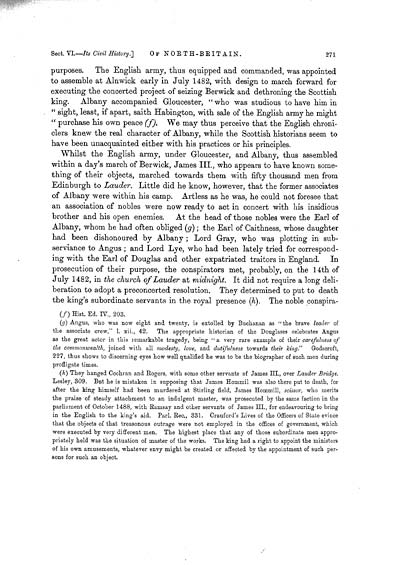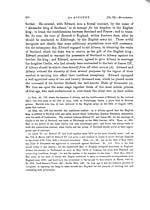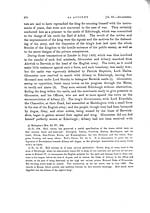Volume 3
(283) Page 271
Download files
Individual page:
Thumbnail gallery: Grid view | List view

271 purposes. The English army, thus equipped and commanded, was appointed to assemble at Alnwick early in July 1482, with design to march forward for executing the concerted project of seizing Berwick and dethroning the Scottish king. Albany accompanied Gloucester, " who was studious to have him in " sight, least, if apart, saith Habington, with sale of the English army he might " purchase his own peace (f). We may thus perceive that the English chroni- clers knew the real character of Albany, while the Scottish historians seem to have been unacquainted either with his practices or his principles. Whilst the English army, under Gloucester, and Albany, thus assembled within a day's march of Berwick, James III., who appears to have known some- thing of their objects, marched towards them with fifty thousand men from Edinburgh to Lauder. Little did he know, however, that the former associates of Albany were within his camp. Artless as he was, he could not foresee that an association of nobles were now ready to act in concert with his insidious brother and his open enemies. At the head of those nobles were the Earl of Albany, whom he had often obliged (g); the Earl of Caithness, whose daughter had been dishonoured by Albany ; Lord Gray, who was plotting in sub- serviance to Angus ; and Lord Lye, who had been lately tried for correspond- ing with the Earl of Douglas and other expatriated traitors in England. In prosecution of their purpose, the conspirators met, probably, on the 14th of July 1482, in the church of Lauder at midnight. It did not require a long deli- beration to adopt a preconcerted resolution. They determined to put to death the king's subordinate servants in the royal presence (h). The noble conspira- (f) Hist. Ed. IV., 203. (g) Angus, who was now eight and twenty, is extolled by Buchanan as " the brave leader of the associate crew," 1. xii., 42. The appropriate historian of the Douglases celebrates Angus as the great actor in this remarkable tragedy, being "a very rare example of their carefulness of the commonwealth, joined with all modesty, love, and dutifulness towards their king." Godscroft, 227, thus shows to discerning eyes how well qualified he was to be the biographer of such men during profligate times. (h) They hanged Cochran and Rogers, with some other servants of James III., over Lauder Bridge. Lesley, 309. But he is mistaken in supposing that James Hommil was also there put to death, for after the king himself had been murdered at Stirling field, James Hommill, scissor, who merits the praise of steady attachment to an indulgent master, was prosecuted by the same faction in the parliament of October 1488, with Ramsay and other servants of James III., for endeavouring to bring in the English to the king's aid. Parl. Rec., 331. Crauford's Lives of the Officers of State evince that the objects of that treasonous outrage were not employed in the offices of government, which were executed by very different men. The highest place that any of those subordinate men appro- priately held was the situation of master of the works. The king had a right to appoint the ministers of his own amusements, whatever envy might be created or affected by the appointment of such per- sons for such an object.
Set display mode to:
![]() Universal Viewer |
Universal Viewer | ![]() Mirador |
Large image | Transcription
Mirador |
Large image | Transcription
Images and transcriptions on this page, including medium image downloads, may be used under the Creative Commons Attribution 4.0 International Licence unless otherwise stated. ![]()
| Caledonia, or, An account, historical and topographic of North Britain from the most ancient to the present times > Volume 3 > (283) Page 271 |
|---|
| Permanent URL | https://digital.nls.uk/74528640 |
|---|---|
| Description | Vol. III. |
|---|---|
| Attribution and copyright: |
|

